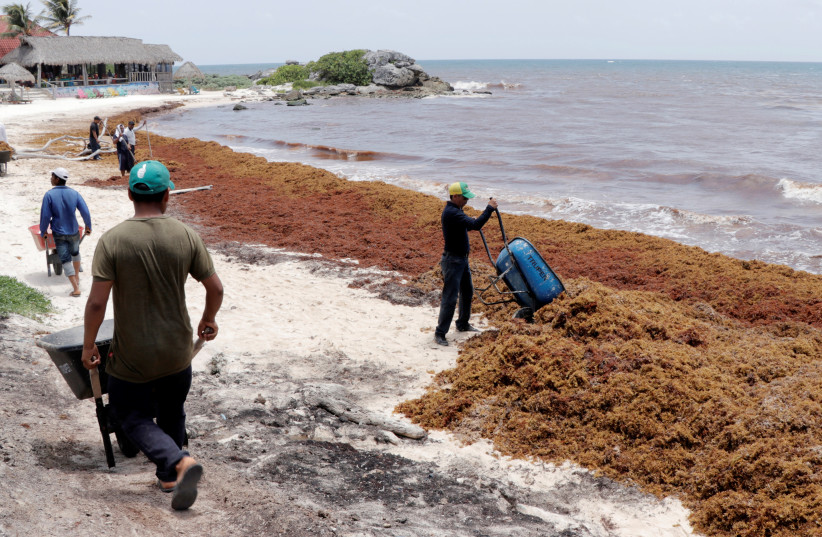A type of algae, Sargassum leads to heartbreak for the many tourists who expect to enjoy white beaches and a clear ocean but instead endure the reek and filth of the decomposing seaweed.
By HAGAY HACOHEN JANUARY 3, 2021 12:15

The famous beaches of the Caribbean nations, badly struck in recent years due to the Great Atlantic Sargassum Belt, which stretches each summer from the Gulf of Mexico to the West Coast of Africa, will enjoy massive improvement thanks to an Israeli innovation.
A type of algae, Sargassum leads to heartbreak for the many tourists who expect to enjoy white beaches and a clear ocean but instead endure the reek and filth of the decomposing seaweed. The reek means the algae has some caloric value, Maof Holdings CEO Ygdal Ach told The Jerusalem Report.
He should know. This happened to him during a 2018 vacation in the Dominican Republic. When he asked hotel workers what they do with the seaweed after they clean the beach, they informed him they just burn it.
“I brought some of that stuff with me to Israel and had it sent to a lab,” he said. “The results were encouraging. The algae these workers were burning could be used to create green energy.”
How? By mixing organic waste with the algae, you can increase its caloric value for methanogen. As their name implies, these microorganisms create methane gas. The bio-gas could be used to create clean electric power for the island-nation, where power production tends to be costly. As well as turning the tourism blight into useful fertilizer. Ach points out that, in his vision, the Sargassum solution is part of a larger set of services to be offered by a 10 million Euro energy generating biogas facilities to be completed in roughly a year and a half in close cooperation with regional universities, international firms, and even a Catholic education network created by Pope Francis.
The Punta Cana Eco-Park, when finally built, will include an educational outreach program that will teach residents to separate their garbage items and other ecological issues. This reduces the costs of production, as raw material can be shipped to the Eco-Park to be used without extra effort, as well as creates a Green Community. The goal is the formation of a circular economy with as little wasted effort as possible. Human waste from local hotels, for example, could be used to turn what is now a pest into a profit-generating innovative project.
“This is not philanthropy,” Ach makes clear, “we are a business and our bottom line has to show a profit.” He also emphasized that his local partners at Universidad APEC are top talents in their respective fields. “We might offer them our help in creating cooperation between the state-level and the business-level to make such an Eco-Park work. But when it comes to the technological skills involved, they already have all they need,” he said.
Three years ago, Sky news reported the town of Omoa, in Honduras, blamed Guatemala for carelessly dumping its plastic waste in waters which eventually reached the tourist destination. While discussing the eco-solution to the so-called “plastic islands” problem, he mentioned how he got a surprising call from Scholas Occurentes.
Created by Pope Francis in 2015 after the publication of Laudato Si, the Catholic educational network is focused on helping humanity meet the challenges of looking after our collective home, planet earth. Linking one hundred universities and 35 organizations, the recently announced agreement between Scholas and Maof puts the Israeli firm in an excellent position to push forward with its activities in the Latin American and Caribbean markets.
“Governments might change, but universities remain and the academic centers we chose to work with have excellent reputations,” Ach said. “The Catholic Church is highly respected in Latin America and, thanks to their good faith, we had been able to achieve a lot in a fairly short time.” “We all want our lives to have a larger meaning,” he added. “What we do here is a real mission.”
